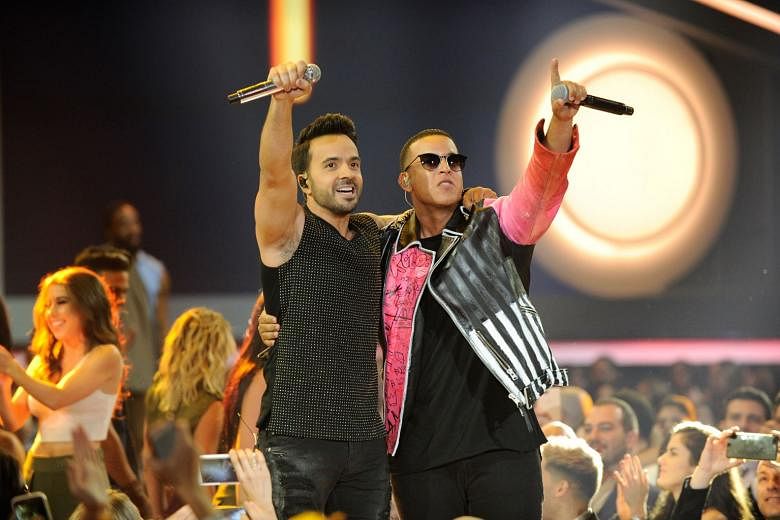Like a global doomsday virus, the catchy Latin tune Despacito is wreaking havoc and turning us into zombies every time the tune comes on.
It seems harmless enough, with its lilting Spanish guitar introduction and heady reggaeton beat that causes involuntary foot-tapping.
But the smattering of English verses aside, those Spanish words that roll off the tongues of Puerto Rican singer Luis Fonsi, rapper Daddy Yankee and Canadian mega pop star Justin Bieber are about, well, sex.
For the record, "despacito" translates to "slowly" and the song is about taking one's time in the act.
Just a few weeks ago, Malaysian broadcaster RTM banned the song on state radio.
What is incredible is how a Latin pop tune, with the help of a verse or two by a global superstar such as Bieber, last month officially became the most-streamed song of all time with 4.6 billion plays across all major music platforms. Bieber's 2015 hit Sorry originally held the record.
The last time a Spanish song dominated airwaves, clubs, weddings and parties this way was in the mid-1990s with the iconic Macarena by Los Del Rio - and that is about a girl who cheats on her boyfriend with two friends while he is being conscripted into the army.
Do lyrics even matter any more for a song to become a pop culture phenomenon or do you just need a mass appeal tune such as Despacito, Macarena or even 2012's Gangnam Style by Psy to win hearts and ears around the world?
The ubiquity of these global earworms cannot be overstated. Released in April, Despacito can still be heard every few hundred metres here - whether you are at the petrol station, in a supermarket, driving on the expressway or getting a haircut.
My brother, who just returned from a six-month exchange programme in South America, says the song was equally inescapable there. He heard the song everywhere, from the streets of Mezcal-town in Oaxaca, Mexico, to the ancient Peruvian city of Cuzco. Nowhere is safe.
Yet I doubt 90 per cent of those who dance to it are celebrating the joys of intimacy.
The days of the socially conscious, Bob Dylan-type "music with a message" songs seem long over (never mind the Toa Payoh MRT station uncle busker).
A quick check on the Spotify Global Top 50 chart shows the likes of DJ Khaled and Rihanna's Wild Thoughts (also about sex) and Bieber and David Guetta's 2U (about going the extra mile for a lover) firmly in the top five.
That is not to say artists are not still trying to champion a cause. Coldplay's recently released EP, Kaleidoscope, features a track called Aliens. It addresses the refugee crisis, where migrants around the world have been forced to flee their homelands. But is the Brian Eno-produced tune chart-topping material? Probably not.
Perhaps our tastes as consumers of music have dulled so much that all we need is a club-friendly dance-floor filler tune. Or maybe, an escapist pop tune that makes you forget all your troubles. That is probably why language does not matter when it comes to these chart toppers - it is just about how a tune makes you feel.
Another Top 5 tune on the Spotify Global Top 50 is J Balvin and Willy William's Mi Gente, another incredibly catchy Latin-pop song that even has its own Snapchat filter. The only other artists who have their own Snapchat filters coupled with songs are the likes of Ed Sheeran, Harry Styles and Charlie Puth. Even the tech giants are taking notice of the proliferation of Latin music.
Are we seeing the rise of a new pop music superpower? After all, Spanish is the second-most spoken language in the world, after Mandarin.
Even English-language crossover acts such as Shakira and Jennifer Lopez are returning to their roots and releasing full-length Spanish albums. Electronic dance music trio Major Lazer's latest single Sua Cara, which is in Portuguese (an Iberian language, just like Spanish), racked up an unprecedented 24 million views on YouTube within 24 hours of its release. Those sorts of figures are usually reserved for your Rihannas and Taylor Swifts.
The wave is slowly gathering momentum. So even though we are all the way in Singapore, we should probably get used to more Spanish songs topping the charts, entering our personal playlists and, ultimately, making us dance.


